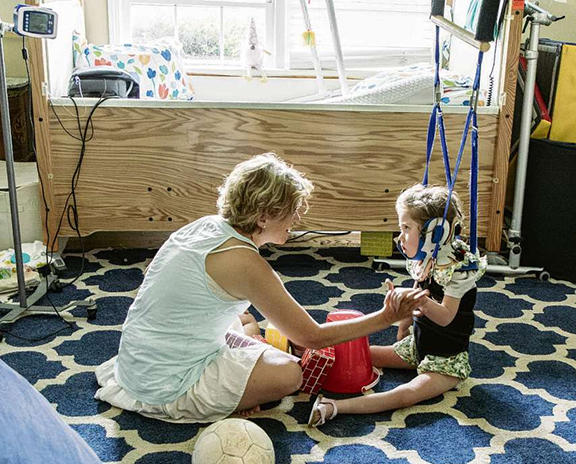
Caption
Mary Cota Reed and daughter Catherine Reed, 8, enjoy a moment in their home.
Credit: Courtesy of Sarah Eaves
|Updated: October 21, 2024 5:04 PM
LISTEN: GPB's Ambria Burton talks to Atlanta mother Mary Cota Reed about the her life as a parental caregiver to her 8-year-old daughter, Catherine, who has hypotonia cerebral palsy.

Mary Cota Reed and daughter Catherine Reed, 8, enjoy a moment in their home.
Caregiving is big business, but it's also at the heart of many American families. In 2024, the U.S. News and World Report shared that 1 in 4 people over age 50 in the United States provides care to a family member or loved one.
However, that statistic does not provide the whole picture when it comes to the number of people who provide care for medically fragile children.
The Georgia Division of Family & Children Services (DFCS) defines medically fragile children as children with "medical status that can rapidly deteriorate, resulting in permanent injury or death; one that requires medical care and/or technology to maintain health; and/or a condition that requires extraordinary supervision and observation."
The Georgia-based Fragile Kids Foundation reports that there are about 13,000 medically fragile children in Georgia, and the Georgia Pediatric Program (GAPP) requires a waiver to provide services to medically fragile children with multiple system diagnoses, including nursing and personal care support services at homes and communities.
While Fragile Kids Foundation, Hospice Savannah's Butterfly Program, and Atrium Health Levine Children's Helping Understand Guidance and Support (HUGS) program are examples of organizations/programs in the state that cater to the care of medically fragile children, there are only six free-standing pediatric palliative care programs for family respite care in the U.S.
The National Center for Pediatric Palliative Care Homes (NCPPCH) aims to provide a pediatric respite home in every state, and Life House Atlanta is a nonprofit public charity aiming to open the first pediatric palliative care home in Atlanta — the first in the Southeast overall. While Life House is raising funds to make building the physical care home possible so that it can provide needed resources, the organization currently focuses on building awareness and creating a support community for affected parents.
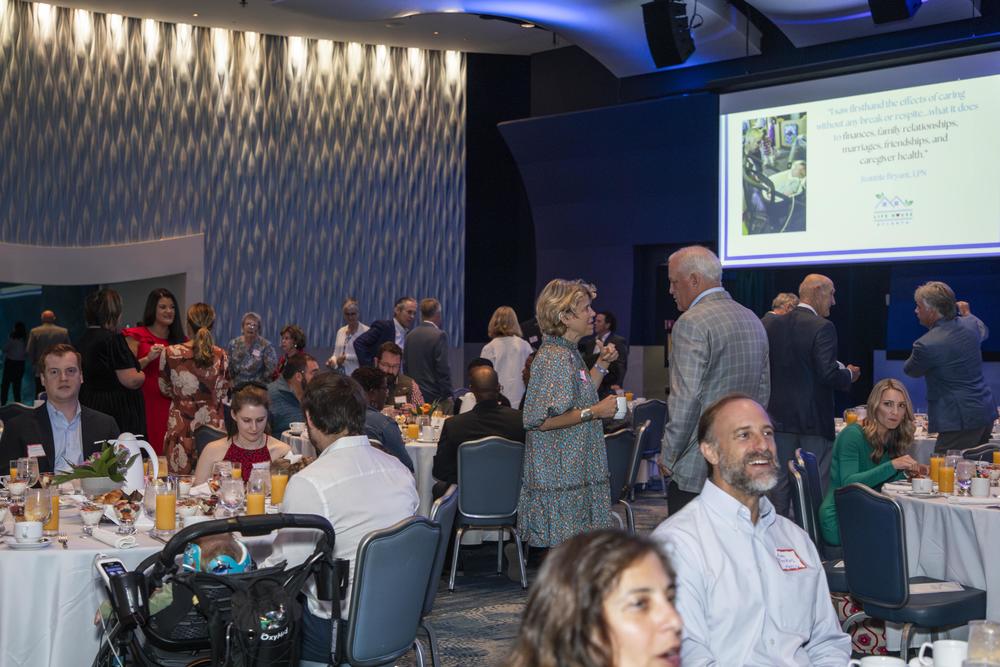
Life House Atlanta held its second annual Breakfast at the Georgia Aquarium event Sept. 24, 2024.
In late September, Life House Atlanta held its second annual fundraising breakfast at the Georgia Aquarium to help raise the charity goal of $100,000 to open a new facility where parental caregivers can send their medically complex children. At the same time, they enjoy a break or respite from the demands of 24/7 caregiving.
"There is a critical need across the world for respite care for families with children on life-limiting journeys," the organization said in a statement about the breakfast.
The goal of the care home would be to help parental caregivers get the breaks they need outside of caring for their medically fragile kids by allowing them to be cared for up to 30 days a year at no cost.
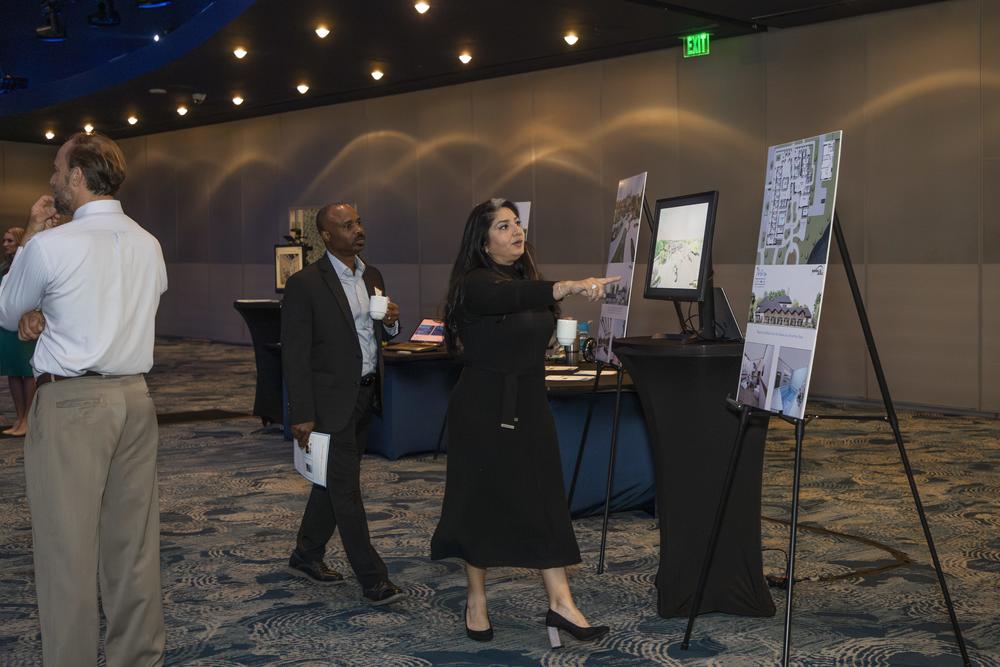
Guests examine displays at Life House Atlanta's Breakfast at the Georgia Aquarium event Sept. 24, 2024.
While Life House Atlanta prioritizes raising funds to build the respite house, the team will take steps to bring respite to the community.
"The first step was a partnership with North Cobb Civitan to sponsor a camper with special needs to attend Camp Big Heart for five nights this past summer," Kathleen Fleiszar, co-founder and executive director of Life House Atlanta, said in an written statement. "This sponsorship provided his mother, who is a full-time caregiver for her son, much-needed respite from 'round-the-clock care."
"I want the parents to know that this respite part is for them and their family and to give them that opportunity to get out of town and be able to not have that stress or anxiety or lack of communication," Fleiszar also told GPB. "They're so isolated, and the community doesn't see them because they're not out there."
"I want them to know that we want to give them that vacation, that respite, and that opportunity to just get out there with their other kids or their family members, go out of town, and we will take care of their loved ones," she said.
Life House Atlanta will be helpful for those like Mary Cota Reed, an Atlanta mother and parental caregiver of 8-year-old Catherine. Catherine has multiple diagnoses but not one overarching diagnosis to summarize all her other diagnoses. Reed is an advocate for medically fragile children and has served on the Life House board of directors since 2021. She discovered the organization while searching online for resources in Georgia to help with her daughter's condition.
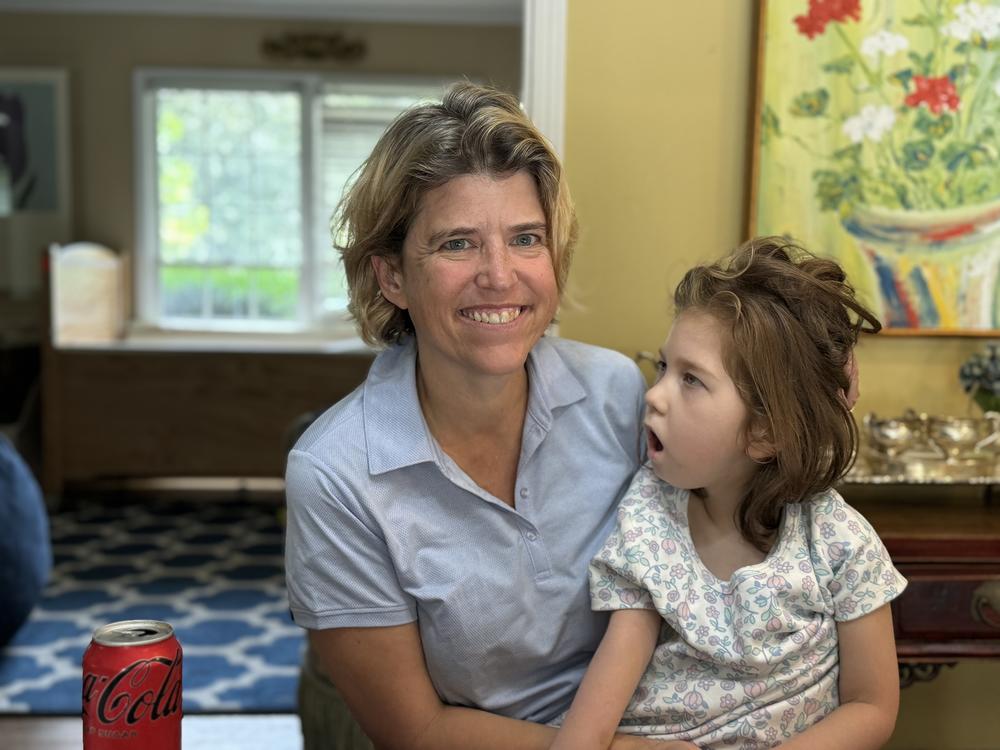
Mary Cota Reed holds her medically fragile 8-year-old daughter Catherine in their Atlanta home in 2024.
"We call it hypotonia cerebral palsy — because that's the only thing we could come up with — and global developmental delay," Reed said. "All of her diagnoses go back to one thing: it is her seventh cranial facial nerve that did not develop right, so because of that seventh cranial facial nerve, she has partial facial paralysis, which means she cannot move her face. She cannot swallow."
Because of Catherine's condition, Mary and her husband, Rob, are always on high alert over things like mucus getting stuck in her throat, causing her not to breathe.
"There's never a moment where we can just relax and let our hair down because we're 24/7 high-alert," she said.
Taking care of Catherine is Reed's highest priority, meaning they rarely get to go out together because one has to stay home with Catherine.
"I am fortunate to have a very supportive husband, so I do get out into the community, and he gets out into the community, but one of us has to stay home," Mary said. "The two of us do not get out together unless we want to pay a lot of money to get a nurse to come here and take care of her, which is not feasible at the time. I miss opportunities to go to the movies or dinner with him."
Reed explained how her experience as a parental caregiver makes her "even more determined" to get Life House Atlanta's pediatric respite house off the ground.
"Life House Atlanta is my passion because I know there are thousands of families out there who are in my situation, and it would make all the difference for my family," she said.
Pam and Tom Brems are the parents of two sons who both died from the same brain malformation within months of each other about 20 years ago.
Pam shared that after experiencing challenges with health care coverage in St. Louis, the family could access benefits from the Katie Beckett program by 1994 when they lived in Georgia.
This program offers Medicaid coverage to disabled children under 18 and waives income eligibility for families, benefiting the Brems family. The Brems used the program to receive nursing care, such as at-home nursing, for a few respite periods.
"For people who don't know what it's like, I always tell people respite care is not a luxury," she said. "It is vitally crucial for a family to survive, quite frankly. When I was 25 years old, they told me that for people who have children like mine, 90% of them end in divorce, and that's because of the stress on the family. I firmly believe that respite care saved us because we made a point of using it."
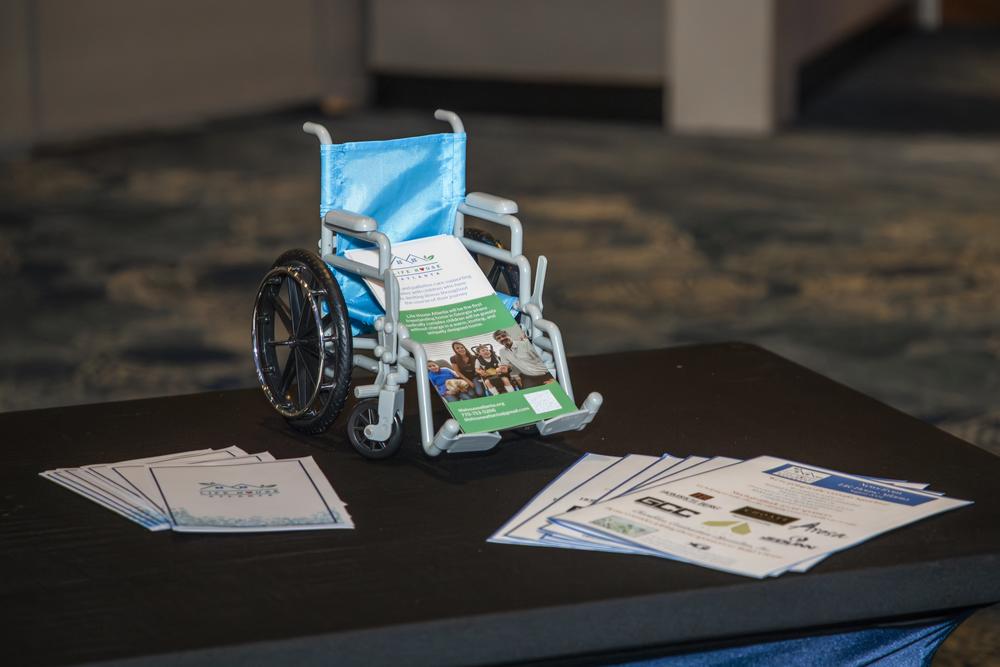
A small display is seen at Life House Atlanta's annual Breakfast at the Georgia Aquarium event Sept. 24, 2024.
Brems said that, based on her brief experience with respite care, when she first heard of Life House Atlanta and their hopes to open a pediatric respite center, she thought the idea would be "phenomenal" for parental caregivers.
"Just to have that as an option for us would have been amazing," she said. "My boys were not as medically fragile as some of the children of families connected to Life House Atlanta. We could get away — many of those families cannot, and that's just no way to have a family.
"[Respite is] incredibly important because of the isolation," she said. "[Life House Atlanta] would be a huge asset, and it's frighteningly and sadly shocking how few of these exist when obviously it can be done — it's being done in other places."
Reed says her ideal future for Life House Atlanta is a building and open doors for families throughout Georgia and neighboring Southern states without pediatric respite homes. In the meantime, she appreciates those who donated at the breakfast and took the time to learn about their vision.
"My future for Life House Atlanta is that we open doors for every family and provide relief to parental caregivers and top-quality palliative care to the children," Reed said. "Respite is for the parents — palliative care is for the children to keep them happy and engaged all day."